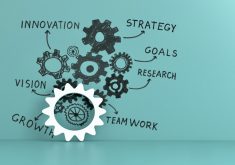One of the highest tides in the world enters Jennifer and Kevin Graham’s front yard twice a day.
Their 30-acre farm near the seaside village of Kingsport, N.S., runs down to the Minas Basin, an inlet of the Bay of Fundy. This area, like the entire stretch of the Annapolis Valley, is peppered with farms big and small, though there are about 70 per cent fewer of them than in 1960.
There are few like Oakview Farm and Greenhouse, however. As Kevin says, they’re “a bit of a throwback,” meaning their farm is more like what would be called a traditional market or truck farm, depending on where you live in the country, and its output ranges from strawberries, raspberries and peaches to tomatoes, peppers and kale, plus eggs and beef.
Read Also

Where convention and innovation meet
How one Ontario farm is integrating technology into their beef operation.
They also run a greenhouse packed with bedding plants, and they operate a stand at Halifax’s busy Seaport Farmers’ Market.
That’s why, when the Grahams needed a cold storage and packing facility, they found their way to FarmWorks Investment Co-operative.
Unlike almost any other investment fund out there, FarmWorks doesn’t put more money into the pockets of large, global entities. Instead, it allows Nova Scotians to buy shares in a diversified portfolio of local food businesses that either farm here or buy at least 50 per cent of their inputs from Nova Scotia farmers.
Those investments provide loans to those Nova Scotian farmers, restauranteurs, brewers, grocers and others.
In other words, FarmWorks is also a kind of a throwback, but in this case to when we used to put our money into the local economy.
It’s also a throwback that seems to be working. Since FarmWorks started selling shares about six years ago, its 354 investors have loaned over $2.2 million to 78 businesses. Only two of those businesses have gone under. The rest of them have helped maintain or create about 475 jobs.
Loans, usually between $5,000 and $50,000, have gone to businesses like Big Spruce Brewing in Cape Breton, which used its $25,000 loan to secure funding from larger lenders, and The Port Grocer in tiny Port Medway, which went from one employee to four full-time and five part-time employees with the help of a loan.
About $30,000 went to the Graham’s Oakview farm between 2010 and 2014 for their cold storage and packing facility.
It wasn’t an easy choice to take the loan, says Graham, but he’s glad they did. “I was really waffling, but it was their [FarmWorks] visits to the farm and their support and encouragement that got me to the place where I said okay, let’s go ahead and do this.”
FarmWorks’ roots
The FarmWorks story begins in 2002, when Linda Best moved back to the Annapolis Valley after a career as a medical researcher. Best had grown up on a pick-your-own apple orchard in Somerset, N.S., and still had many connections in the province’s agricultural sector.
So when she moved back, she began noticing the toll that the drop in farm numbers was having, with aging farmers, an inability to sell farms, and a lack of local, healthy food for consumers.
Add to that the loss of about 7,000 food processing jobs just after the turn of the Millennium, plus, in the Annapolis Valley, a 70 per cent drop in pork production alone between 2009 and 2010.
Best knew she had to do something. “I’m one of these people who wants to get things done,” she says.
In June 2009 one possible solution presented itself. At a talk called “Investing Close to Home,” Best heard about community economic development investment funds (CEDIFs), which are essentially ways for people in a community to pool their money and invest in local businesses.
There are a few different versions of them across the country, but for most investors, one of their biggest draws is the tax incentive. In Nova Scotia, CEDIF investors receive a 35 per cent provincial tax credit with a five-year hold, and 20 and 10 per cent credits for subsequent five-year holds.
Best was hooked by the idea, and a few years after hearing that talk, she and a few friends launched their own CEDIF — FarmWorks — from her living room. “We knew that if we were going to start fixing our health and economic issues, we had to have better food, and people had to have jobs,” says Best. “And we realized that a fund that enables people to invest in businesses right here, right across the food chain, would provide jobs and allow people to afford healthy food.”
One of the early FarmWorks loan recipients was Fruition (now Springhouse), which has been making and selling nutritious takeout food and grocery items from the Halifax Seaport Farmers’ Market since 2011. In 2013, co-owners Jessie Doyle and Seth Graham decided to expand the business, moving to a storefront location at the market that would mean a bigger kitchen, more equipment, more staff and a higher rent. To take that step, they needed an increase in cash flow, so they asked for — and received — an $8,000 loan from FarmWorks.
They went to the co-operative, says Doyle, not just because they needed a loan but because they share similar values. “Seth and I are both really passionate about local food, and we structure our business so that we can purchase from local farmers as much as possible. So we were passionate about what FarmWorks was doing — supporting local food right here in Nova Scotia.”
More than money
Doyle and Graham also found that compared to working with larger lenders, the experience of working with FarmWorks was quite different, and more positive. “They’re very community minded, very warm and welcoming and accepting,” says Doyle. “They have a lot of people with wisdom and experience on the board, and they definitely always made it known to us that they were there for us should we need them, should we have any questions.”
That mentoring component is no accident, by the way. In fact, says Best, the money is probably less than half of the total value that FarmWorks provides. “We tell our clients that when we hand over that cheque, don’t think that you’re ever going to get rid of us. We have a number of businesses that are smaller, not exactly sure how to go about it; there are lots of questions for them. And so between our directors and advisers and anybody else if we need to find somebody else, we will do that. And that starts in many cases as soon as they apply.”
Such was the case with Oakview Farm and Greenhouse, and as Kevin Graham now believes, if it hadn’t been for that mentoring component, he probably wouldn’t have gone through with accepting a FarmWorks loan. “The confidence they had in the project was a big factor, and that they could see the idea and that it would certainly add a lot to what we were doing and make our life easier here. And they were right.”
The result of that financial support and mentorship is clear in the success of the businesses FarmWorks has invested in and the returns investors are seeing, which, says Best, amount to about a doubling of their original investments over the 15 years when you factor in the tax credits and dividends.
More important than those returns, though, are the potential health and employment impacts that FarmWorks can have in the province, says Best. She once sat on the board of Capital Health, a provincial health authority that delivered core health services to 40 per cent of the population. This fiscal year, Nova Scotia has set aside a whopping 40 per cent of its $10.6 billion budget for health care costs.
“Sitting on that board, it quickly became clear to me that we’re not going to fix health in this province until we fix food. But people have to have good jobs to be able afford that good food. And so FarmWorks is one way to support the production of good, healthy food and job creation at the same time.”
Future FarmWorks?
While community economic development funds are nothing new in Canada, there don’t seem to be any other parallels for FarmWorks in the country with a fund that strictly supports food-related enterprises.
That could change, however, says Best, as there are small groups in British Columbia and Ontario that are trying to get FarmWorks-like CEDIFs off the ground. She has spoken or formally presented to them multiple times. The biggest challenge appears to be convincing provincial governments to provide the tax credits to investors, not to mention simply getting those governments to pay attention.
Best is hopeful those challenges will be solved, however, as policymakers see the positive impact FarmWorks is having on Nova Scotia’s agriculture, health and economy. “Look, we know that governments don’t have a lot of money to do the things they might otherwise do. But we can, in fact, do for ourselves. And that’s what FarmWorks is all about: encouraging people to do for themselves.”
Back at Oakview Farm and Greenhouse, the tide is coming in. Graham says he’d definitely consider going with FarmWorks again if they had another project that needed a loan. His biggest reason is that FarmWorks takes a much more democratic approach to farming than some of the large agricultural entities out there. “Some of what those other groups are doing is very unhealthy for the future of farming,” he says. “There’s too much farm wealth concentrated in too few hands, and they’re not really reinvesting in new young farmers. FarmWorks is doing that investing, and they’re supporting small farmers too. And I think all of that encouragement goes a long distance to providing food security down the road for the province.”














